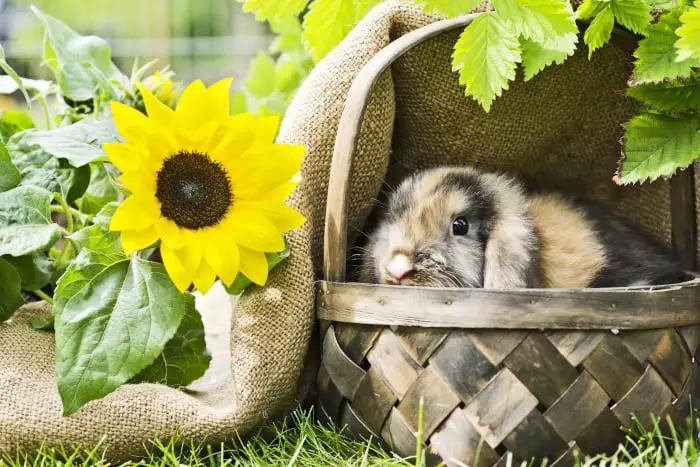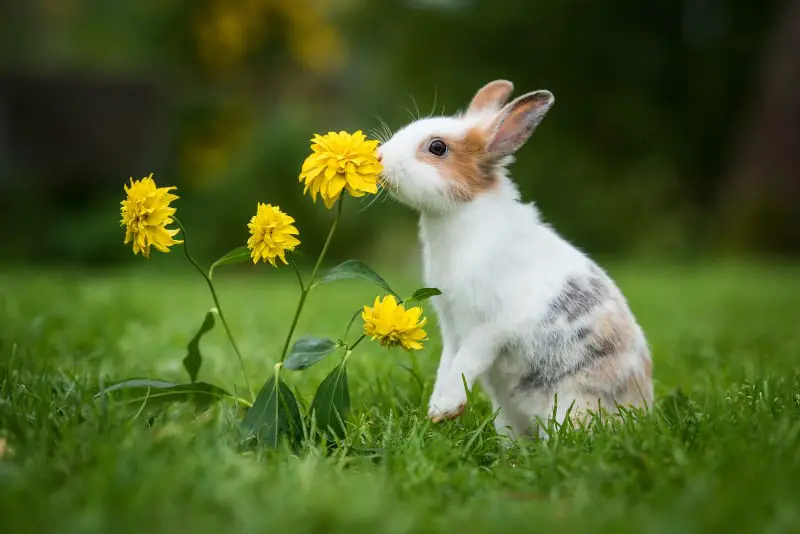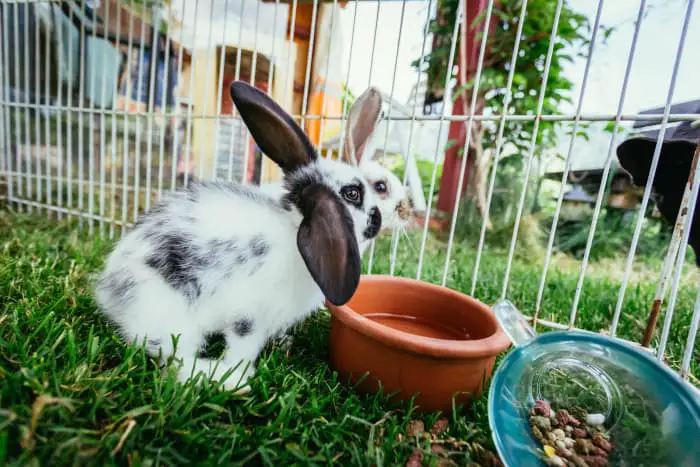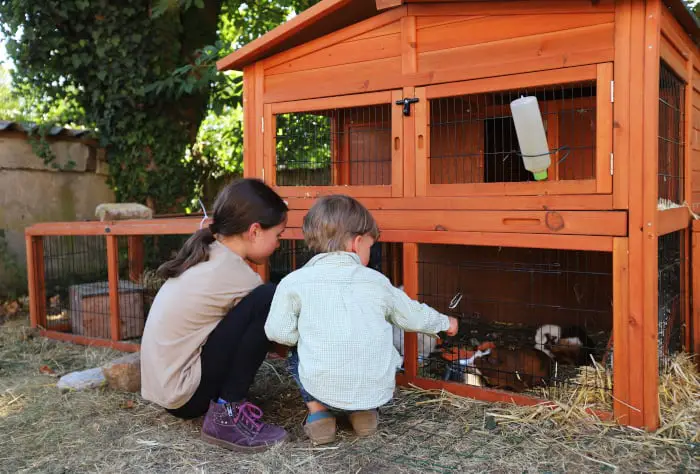Many new rabbit owners may be curious about whether or not pet rabbits can live outside. We see bunnies outdoors all the time, so why can’t ours live outdoors, as well? The truth is, bunnies have been outdoor pets for longer than they’ve been indoor. Like most pets, bunnies are naturally wild, and an outdoor environment can actually suit them better than an indoor environment. They get more exercise, more fresh air, and they tend to be all-around happier and healthier.
You can either keep your rabbit outdoors full-time, which will need creating them an outdoor home of sorts, called a rabbit hutch, or simply keep your rabbit outdoors in the day and then take them back in at night once it gets colder and the predators come out, which will require building them a rabbit pen or a rabbit run, similar to how you would for a dog. Either way, it is most important to remember, rabbits are prey, so there are a few accommodations you will need to take into account that might differ should you choose to keep your pet rabbit outdoors full-time or part-time. Now, let’s take a look at some simple steps to take if you want to let your pet rabbit live outdoors.
Letting Your Pet Rabbit Live Outdoors Full-Time
If you’re going to let your pet rabbit live outdoors full-time, you should make sure that the weather never gets too cold and that your area isn’t too overrun by predators. You are going to want to start your rabbit outdoors at a pretty early age, otherwise, they won’t be used to it, and you’re also going to want to make sure your pet rabbit is a larger variety. Dwarf bunnies shouldn’t be full-time outdoor pets.
Make Sure Your Yard Is a Good Environment: No Poisonous Plants
Of course, you can’t have any plants growing in your yard that could harm your rabbit should they decide to take a nibble, which they most likely will.
Taking precautions to know what kinds of plants are growing in your yard is a must if you are going to let your rabbit roam for any amount of time, and especially if you’re keeping an open area for them to live outdoors full-time. Typical offenders include:
- Chrysanthemums
- Begonias
- Aloe
- Avocado plants
- Calendula
- Cherry trees
- Apple trees
No Fertilizers or Pesticides
Just as with poisonous plants, chemical fertilizers and pesticides are, in fact, poisons, and use of them in your yard can seriously affect the health of your rabbit if they are living outdoors. Your rabbit is going to be chewing and gnawing the scenery and if there is poisonous chemical residue on the plants, those may as well be poisonous no matter what kind of plant they are.
If you want your rabbit to have a home in your yard, be sure that you use only natural fertilizers such as manure, and only natural pesticides, or none at all.
No Debris or Chemical Waste
If you have a bunch of scrap metal or other junk in your yard piling up, this can be a pretty serious hazard for your bunny. Your rabbit will most likely view piles of junk as a playground, and if there are jagged edges, then your pet rabbit could easily get injured.
Additionally, piles of junk can collapse on unsuspecting bunnies, killing them in an instant. Another thing to keep in mind is that you are going to want to make sure that toxic materials, such as old cans of paint and containers of antifreeze, are locked away in a shed that your pet rabbit does not have any access to.
Give Your Rabbit a Hutch, or Shelter
A hutch can be any enclosed area, such as in a shed or garage, that will allow your full-time outdoor pet rabbit to escape any danger, whether it be from the elements or from prey. Therefore, this area needs to be easily accessible but with a small enough entry that prey cannot follow.
It should also be weatherproof, so that your pet rabbit can stay from warm and dry when it needs to.
Keep Them Warm
Especially in the winter, it is imperative that your rabbit has a place to go where they can warm up. This doesn’t have to be anything incredibly fancy unless you live in a very cold climate, but simply giving your rabbit a place where they can keep out of the wind, snow, and rain should be enough to keep them warm.
You can fill the hutch with old blankets and hay that will give your rabbit a place to burrow.


Keep Them Dry
If your rabbit gets wet, they will need a place where they can go to dry off and keep from getting any wetter.
You will need to make sure that your hutch allows them a place where water won’t leak so they can properly dry and stay dry until any storm passes. A few towels mixed in with some of the blankets and hay isn’t a bad idea, either.
Give Them a Place to Hide
Of course, if your rabbit is going to be outside full-time then the chances of them facing a predator at some point in their lives are pretty high.
Whether it be raccoons, foxes, coyotes, hawks, or just neighborhood cats, predators are everywhere in all climates. A safe and secure rabbit hutch will allow your rabbit a place to hide away and escape dangerous predators.
Have a Tall and Deep Fence
Whether you’re keeping your rabbit outdoors full-time or part-time, you are most likely not going to want them to be able to leave your property. While you can rabbit-proof your own yard and take all the precautions necessary to keep as many predators out as you can, you simply cannot control the outside world, and it’s a fact of life that the outside world is pretty dangerous for little bunnies.
Make sure your fence is over six feet tall so your pet rabbit can’t jump over and most predators can’t jump over, either. Also make sure that your fence is at least one foot deep so that your pet rabbit can’t easily dig under and get out.
Keep the Environment Clean
Just like with a dog, you need to make sure that you pick up your pet rabbit’s waste often. I would recommend that you pick up poop daily so that it doesn’t become uncomfortable or risky for your pet rabbit’s health.
Keep Their Dishes Clean
Dishes are another thing that can get pretty dirty when left outside, and you should give your pet rabbit’s dishes a good clean at least once a day, or even just rinse them out with every meal.

Keep Their Hutch Clean
Your pet rabbit’s hutch may get pretty dirty, too, as they track in mud and dirt and other elements, and maybe even some waste.
Keep the hutch clean to ensure that no bacteria or parasites are growing and to make sure that your rabbit is fully comfortable. If your pet rabbit isn’t comfortable in their hutch, they might not make use of it as often as they should, which can lead to increased danger.
Make Sure Your Rabbit Won’t Destroy Your Property
Lastly, whether your rabbit is outdoors full-time or part-time you need to be aware that bunnies are mischievous little creatures that can usually do things they’re not supposed to, and not only can that be dangerous for your rabbit but it can also be dangerous for your belongings.
Bunnies will gnaw and claw at everything and use practically anything as a toy. They can destroy wires, hoses, car parts, etc. Be sure to keep your yard clean of random stuff both for their benefit and for yours. Keep all utilities properly stored, don’t have any cars parked in the yard, etc.
Also, be aware that your pet rabbit will tear apart your garden if leave him there long enough so having either your garden enclosed or limiting your rabbit’s reach to a specific area is a good idea.
Letting Your Pet Rabbit Live Outside Part-Time
If you aren’t totally comfortable with letting your rabbit live outside full-time, then the second option is to keep them outside part-time. Bunnies do need a good amount of play, and if they don’t get their energy out with proper outdoor time, it can affect their health and their mood and might even cause them to do a fair amount of damage to your home.
If your rabbit is only kept outside part-time they may not feel as comfortable in this environment at first so this requires some additional care. You will need to make either a rabbit pen or a rabbit run, and keep a careful eye on your pet rabbit so they don’t get into any trouble no other creatures put them in danger.
Make a Rabbit Pen or a Rabbit Run
About Rabbit Pens
A rabbit pen is a portable cage that you can place anywhere in your yard to allow bunnies fresh air while also keeping them protected from the elements, predators, from your yard, and your yard from them. You can make a pen for a rabbit out of the same materials that you would make a dog pen out of.
Be sure to put some food and water in the pen if you’re going to leave your rabbit there for a long time, and also throw in some toys as well, such as cardboard rolls and balls. I would advise that your outdoor pen has a roof so your rabbit can’t escape and no predators can get to them.
About Rabbit Runs
A rabbit run would be just the same as a dog run, meaning a designated, fenced-off area where your pet rabbit can run around and play without escaping, getting into anything else in the yard, or getting attacked by predators. The difference between a run and a pen is that a run is a permanent fixture, and is usually a good deal larger. Your pen can be as big as you want, and the bigger the better. The more room your pet rabbit has to run around, the happier they’ll be.
Make sure to have a pen with materials that bunnies can’t chew through and that you dig it deep enough that your rabbit can’t dig his way out from under it. You want your run to be enclosed with a roof, as the fence would have to be about 6 feet tall in order for your rabbit not to be able to jump over it.
A run can have food and water dishes and should have plenty of toys. Fresh hay is great, as bunnies enjoy playing with and burrowing in the hay and it can also make them feel protected. It’s also a good idea to have a box or something that your rabbit can run into and hide away from loud noises and predators. And in either a pen or a run, making sure that your rabbit gets a good amount of shade is imperative. Bunnies don’t like to be trapped out in the sun, and overexposure can greatly affect their health.
Maintain Supervision
If you’re only keeping your rabbit outside part-time, you are going to want to keep a close eye on them, as they won’t be as prepared for the outside world as they would be if they were fully adjusted to outside living. Bunnies can be timid, especially if they’re used to being indoors, so making sure that nothing is scaring your rabbit and that your rabbit isn’t getting into anything dangerous is going to be a good idea to ensure that they’re having safe and healthy outdoors time.
Bunnies Are Made for the Outdoors!
So, there you have two ways in which you can give your pet rabbit outdoors time. While rabbits can certainly live outside, and this has actually been a tradition for as long as bunnies have been kept as pets, you may opt to keep them outdoors only part-time due to extremely cold weather at night or an increased predator count in your area. Either way, letting your pet rabbit spend a good majority of their time outdoors is great for their overall health and wellbeing, you just need to be sure to take some precautions so as to ensure that your pet rabbit is safe and well taken care of.




